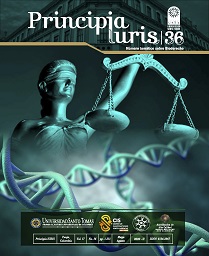Universal ethics and multicultural biolaw
Main Article Content
Abstract
Article Details
Por medio de esta comunicación certifico que el artículo que estoy presentando para posible publicación en la revista institucional impulsada de la Facultad de Derecho de la Universidad Santo Tomás seccional Tunja, Principia Iuris, es de mi entera autoría, siendo sus contenidos producto de mi directa contribución intelectual.
Todos los datos y referencias a publicaciones hechas están debidamente identificados con su respectiva nota bibliográfica y en las citas que se destacan como tal.
Por todo lo anterior, declaro que el material presentado se encuentra conforme a la legislación aplicable en materia de propiedad intelectual, y por lo tanto, me hago responsable de cualquier reclamación relacionada a esta.
En caso de que el artículo presentado sea publicado, manifiesto que cedo plenamente a la Universidad Santo Tomás seccional Tunja los derechos de reproducción del mismo y accedo a las modificaciones que de forma se requieran para adaptarse a la estética de la revista. Como contraprestación de la presente cesión, declaro mi conformidad de recibir (2) ejemplares del número de la revista en que aparezca mi artículo.
References
Lovelock, J.E. (1979). Gaia - A New Look at Life on Earth. Oxford: Oxford University Press 1979).
Macer, D.R.J. (1994). Bioethics for the People by the People. Christchurch: Eubios Ethics lnstitute.
Macer, D.R.J. (1998). Bioethics is Love of Life. Christchurch: Eubios Ethics Institute.
Mill, John Stuart (1961). On Liberty. Reprinted. Garden City, N.Y.: Doubleday.
Morioka, M. (1991). The Concept of "Inochi": A Philosophical Perspective on the Study of Life. Nichibunken Japan Review, 83-115.
Rai, ].S., Thorheim, C., Dorjderem, A. & Macer, D.R.J. (2010). Universalism and Ethical Values for the Environment. Bangkok: Regional Unit for Social and Human Sciences in Asia and the Pacific (RUSHSAP), UNESCO.
Sakamoto, H. (1996). Foundations of East Asian Bioethics. Eubios Journal of Asian and International Bioethics, 6, 31-32.
Valdés, E. (2012). Fritz Jahr and his Bioethical Imperative. Eubios Journal of Asian and International Bioethics, 22(3), 123-128.

